Campaign in Italy (1796-1797)
In 1796, a practically unknown officer, appointed by favor, became head of the Army of Italy, which had to serve as a diversion from the main French offensive in Germany. A year later, after a succession of victories that gave him an unrivaled prestige, General Napoleon Bonaparte spoke as equals with the French and Austrian governments.

Borghetto
The passage of the river Mincio, near Valeggio, gave rise to a fierce confrontation.

Bassano
Again beaten, the Austrians led by Dagobert von Wurmser had to seek refuge into Mantua.

Arcole
The crossing of the river Alpone required three days of fierce fighting.

Rivoli
Following this battle, the Austrian hopes of unlocking the city of Mantua were dashed.
Egyptian Campaign (1798-1799)
Being too popular for the French Directory, whose deep corruption had not yet made imminent its fall, Bonaparte received the mission to carry on getting fame and honor far from Europe, in the fascinating Middle-East.
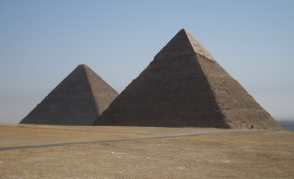
Pyramids
A few miles from the Pyramids of Giza, just before the battle, General Bonaparte harangued his troops with those words that passed to posterity: Soldiers, from the summit of yonder pyramids forty centuries look down upon you!
The Mamluks, intrepid horsemen, impetuously rushed over the French squares, but found there nothing but death and defeat.
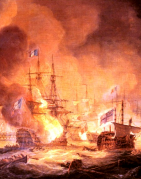
Battle of the Nile
Subsequently to this naval battle won by Horatio Nelson, Bonaparte found himself deprived of his fleet, and prisoner of his conquest.

Mount Tabor
The Turkish army, which had come to rescue the besieged city of Acre, was destroyed in this battle.
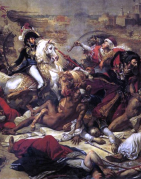
Abukir
The Ottomans, that the British had landed at Alexandria, were thrown there into the sea.
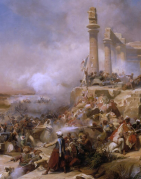
Heliopolis
General Jean-Baptiste Kléber gave there to the French Republic its last victory in Egypt.
Second Campaign in Italy (1800)
Napoleon Bonaparte, once became First Consul, planned to beat the second coalition, which had almost defeat the republican French, while himself was fighting in Egypt.
What better way for that, than returning to the scene of his first exploits, to combat once again Austria?

Siege of Genoa
GeneralMasséna resists to the extreme limit despite famine and epidemics.

Montebello
This victory of General Jean Lannes opened the road to Alessandria and Marengo.
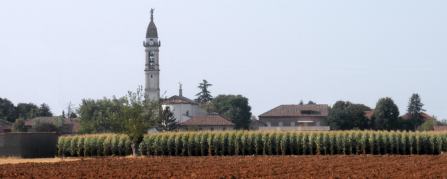
Marengo
That day, in the plain of the Bormida, east of the city of Alessandria, the First Consul Napoleon Bonaparte rolled the dice, and won in extremis against the troops of the Holy Roman Empire led by General Michael von Melas!
Operations in Germany in 1800
Strategically, the Italian campaign of 1800 was initially just a diversion designed to facilitate the main attack on Germany. General Jean-Victor Moreau was given command of the latter.

Hohenlinden
General Jean-Victor Moreau won a decisive battle in Bavaria, that forced Austria to leave the second coalition.
Campaign in Germany (1805)
The French army was gathered around Boulogne and everything was ready for the invasion of England. Admirals had their instructions, which were to attract the English fleet far, far away, on the other side of the Atlantic ocean. Then it would be sufficient to cross the Channel on thousands of barges gathered for this purpose. But the defeat of Trafalgar and the bustle in Europe forced Napoleon to change his plans. Steering: Vienna!

Elchingen
Marshal Michel Ney, present everywhere in the heart of the fighting, wrote one of the pages of his legend.

Austerlitz
Emperor Napoleon I won in Moravia his most striking and most historic victory, against Russian and Austrian troops, under the gaze of Emperors Alexander I of Russia and Francis II of the Holy Roman Empire. This fight was named "The Battle of the three Emperors".
1805 Sea Campaign
After having sealed the failure of the landing project in England by locking himself in Cadiz, Admiral Villeneuve lingered too long in this port. When he decided to leave, Nelson was there, with an English fleet infinitely more seasoned and better equipped than Villeneuve's Franco-Spanish squadron. Villeneuve will suffer one of the worst defeats a sailor has ever experienced. He won't recover.

Trafalgar
Horatio Nelson finished on that day his work of destruction of the French fleet.
Campaign in Prussia (1806)
Prussia, prudent during the 1805 campaign, allowed himself to circumvent the following year by Russian and British promises. This proved to be wrong: two weeks after its ultimatum, it had no more army. Fifteen days later, Napoleon entered Berlin.

Auerstaedt
Marshal Louis-Nicolas Davout, alone, defeated the largest contingent of the Prussian troops.
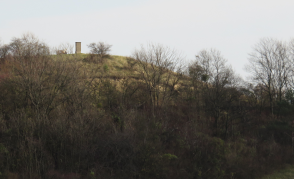
Jena
While Marshal Davoust was victorious at Auerstaedt, the second part of the Prussian army was destroyed at Jena by Napoleon himself. The campaign had begun only last fortnight...
Campaign in Poland (1807)
In autumn 1806 the Russians had not had the time to lend a hand to their Prussian ally, whose collapse was as sudden as unforeseen. They gave asylum to the King of Prussia and continued fighting in East Prussia, under the command of General Levin August von Bennigsen.
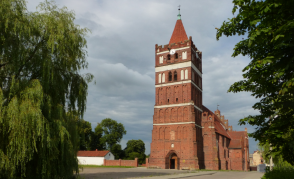
Friedland
For the anniversary of Marengo, the battle of Friedland was a total victory for Napoleon, which forced the Russians and Prussians to deal with him: thus the Treaty of Tilsit marked the end of the War of the Fourth Coalition.
Peninsular War (1808-1814)
During five years, the Peninsular war eroded the French army and consummated its best soldiers. The French were unable to defeat a Resistance that came from the depths of a spanish population fanaticized by priests, in which the Afrancesados (partisans of the French, often imbued with the ideas of the Enlightenment) were a minority.
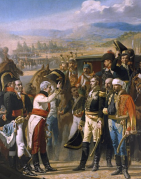
Bailén
First terrestrial defeat of the Napoleonic armies, Bailen gave hope to all the enemies of French.
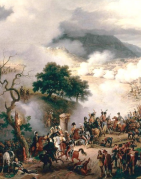
Somosierra
This battle opened the road to Madrid to Napoleon, who had personnally come to install his brother Joseph on the Spanish throne.
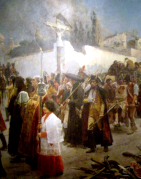
Zaragoza
After two months of siege and 100,000 dead, the city fell into the hands of the French.
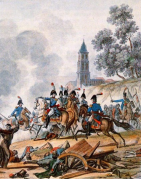
Ocaña
By inflicting the Spanish army its biggest defeat of the war, Marshal Jean-de-Dieu Soult opened to himself the way to Andalusia.
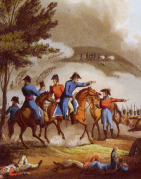
Salamanca
Two months after this French defeat south of Salamanca, the Anglo-Iberian troops took Madrid.
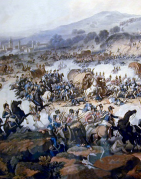
Vitoria
The French army, fleeing, suffered a rout, which was however tempered by the greed of the conquerors.
Campaign in Germany and Austria (1809)
Noting the French difficulties in Spain, Austria believed the time for revenge had come, and declared war on French. Its army was intrusted to one of the brightest opponents that Napoleon never had to fight: the Archduke Charles. Unprepared, the French experienced a difficult campaign.

Eckmühl
Near Regensburg in Bavaria, the stubborn resistance of Marshal Davout then Napoleon's arrival made this confrontation a victory, but not the decisive battle the Emperor had dreamed of.

Aspern-Essling
Cut off from its bases by the rupture of a bridge over the Danube, half of the French army managed to avoid annihilation but suffered heavy losses.

Wagram
On a battlefield near Aspern and Essling, in the plain of Marchfeld, Napoleon finally won the big victory that forced Austria to treat with him. But the time for quick wins had gone, giving way to that of slaughters.
French invasion of Russia (1812)
Russia, unwilling to respect the treaty of Tilsit whose clauses in international trade faced its interests, had increasingly distanced itself from French over the years. Napoleon could not compromise, since it undermined his struggle against England. The confrontation, which had become inevitable, was gigantic.
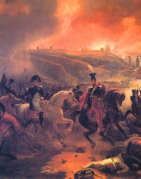
Smolensk
Napoleon seized the city of Smolensk on fire and in ruins, which could not serve him as a source of supplies for the continuation of the campaign.
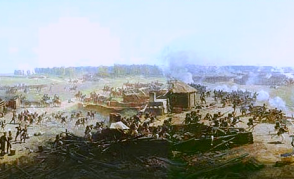
Borodino (The Moskva)
Mikhail Kutuzov finally offered to the French the battle they had hoped since the beginning of the campaign. Without convincing results.

Berezina
A part of the French army managed to cross the Berezina River under threat from the enemy, with heavy sacrifices.
Last Campaign in Germany (1813)
Who else but Napoleon could have been able to face the European coalition in the aftermath of a rout like in Russia? Yet in 1813, the fate was several times about to declare in his favor.

Lützen
The lack of cavalry prevented the French army to exploit this considerable success as it would have had.

Dresden
This was the last major success in Germany for Napoleon, who was ill and could not exploit his success.
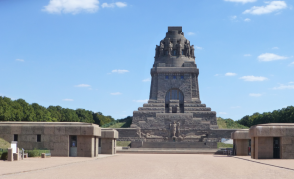
Leipzig (Battle of the Nations)
At one against two, betrayed by his allies, and a victim of blows of fate, Napoleon conceded on that day his heaviest defeat and lost the initiative.
Campaign in Northeast France (1814)
Cornered, fighting for the first time on French soil, Napoleon was more than ever to rise to the occasion. As he said himself, he had "put on his Italian boots" and realized one of his finest campaigns.

Brienne
Marshal Blücher, only just managed to elude capture, which could have changed the face of the campaign.

La Rothière
Napoleon, who had not wanted this battle, was defeated after a great resistance.

Champaubert
This was the first of four commitments, which turned into a disaster for the invaders.

Montmirail
Although twice as numerous, Russians and Prussians were defeated by French.

Château-Thierry
The Emperor pursued his enemies of yesterday and inflicted them another failure.

Vauchamps
It was the turn of Blücher in person to be punished. In four days, his army lost 30,000 men.

Montereau
The Emperor triumphed again but his plans were undermined by the slowness of some subordinates.

Craonne
Another success for the Emperor, yes, but this time it was a Pyrrhic victory.

Laon
Napoleon attacked Blücher: an attempt that was difficult to justify, and which did not succeed.

Arcis-sur-Aube
Considerating that this battle was turning into a strategic failure, Napoleon abruptly broke the struggle to make other arrangements.

Fère-Champenoise
The defeat of Marshals Auguste Viesse de Marmont and Adolphe Mortier opened the road to Paris to the Allies.
Campaign in Belgium (1815)
It took little time for Napoleon, after his return from Elba, to understand that his throne, again, depended on his ability in defending it. He accepted the challenge.
In other circumstances, could have he achieved that goal?
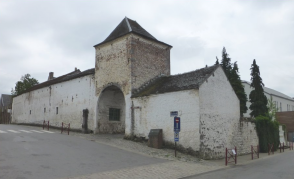
Ligny
For the very last time, Napoleon inflicted another setback to his old adversary Blücher, this in Walloon Brabant, south of Brussels.
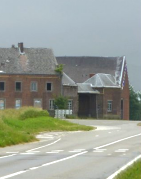
Quatre-Bras
Simultaneously, fifteen kilometers from Ligny, Marshal Michel Ney fiercely fought against the troops of the Duke of Wellington.
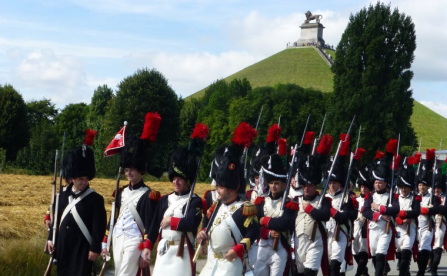
Waterloo (Mont-Saint-Jean)
The Imperial epic reached its denouement in this confrontation without mercy among Arthur Wellesley of Wellington's defence and Napoleon's offensive.
But it was ultimately the General perhaps most often defeated by the Emperor, who tipped the scales: Blücher, whose late arrival closed the final chapter in the military history of the French Empire.

Wavre
On the battlefield of Wavre, Marshal Grouchy won a useless victory over the Prussian rearguard because his success only came after the decisive intervention of the rest of Blücher's forces at Waterloo. He then masterfully led a retreat which allowed him to return to France at the head of an army in good order of nearly 60,000 men.
Caption
 French victory
French victory Uncertain outcome
Uncertain outcome French defeat
French defeat Current country where the battle was held
Current country where the battle was held









